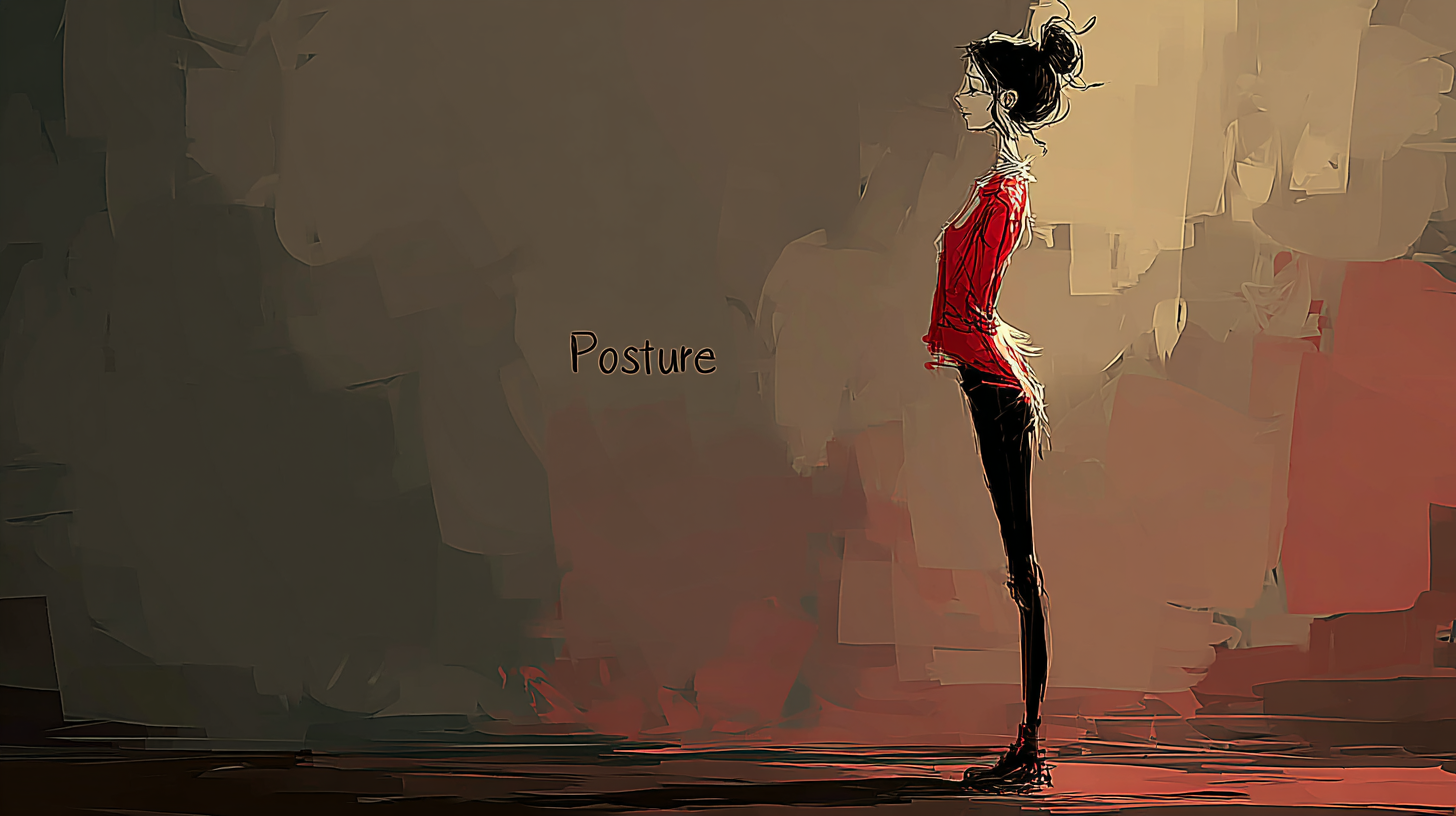“Posture” means the way someone holds their body or shows an attitude about something.
「posture」は、体の姿勢や、人があることについて見せる態度のことです。
以下は英単語 “posture” に関するストーリー型学習コンテンツです。まずは大枠の意味を理解して最後の文章で確認しましょう。
「posture」の主な意味(main meaning)
| 品詞 | 意味 | 発音記号 | 英語例文 |
|---|---|---|---|
| 名詞 (noun) | 姿勢、立ち居振る舞い | /ˈpɒs.tʃər/ | She corrected her posture while sitting at her desk. |
| 名詞 (noun) | 態度、考え方 | /ˈpɒs.tʃər/ | The company’s posture on the issue was clear. |
| 動詞 (verb) | 見せかけの態度を取る | /ˈpɒs.tʃər/ | He postured as a strong leader during the crisis. |
「posture」は “体の形/姿勢” と “物事に対する態度” の両方で使われます。
体の姿勢(①)として使うときは、学校・勉強・スポーツで「背筋を伸ばそう」「良い姿勢で座ろう」などの文脈で出てきます。
態度・立場(②)として使うときは、会社や団体、国などが「この問題に対してこういう姿勢を取っている」という意味で使います。
見せかけの態度(③)は少しネガティブな意味になり、「本当はそうじゃないけど、あたかも〜のように振る舞う」というニュアンスがあります。
単語の語源はラテン語 positura(置くこと) で、「体をある位置に置く/態度をある形に決める」という「置く/置かれる」のイメージがあります。
「posture」の語源(etymology)
“posture” はラテン語の positura(置くこと)から来ており、「体をある位置に置く」「態度をある形に決める」というイメージが核にあります。
「posture」の類義語(synonyms)
| 類義語 | 英語例文 |
|---|---|
| stance | His stance on the policy surprised everyone. |
| attitude | She showed a positive attitude during the meeting. |
| position | The guard took a defensive position. |
| bearing | Her proud bearing impressed the judges. |
| pose | He struck a dramatic pose for the camera. |
「posture」の反義語(antonyms)
| 反義語 | 英語例文 |
|---|---|
| slouch | He slouched in his chair all day. |
| neutrality | The country maintained a posture of neutrality in the conflict. |
「posture」のコロケーション(collocations)
| コロケーション | 英語例文 |
|---|---|
| good posture | Good posture helps prevent back pain. |
| defensive posture | The army took a defensive posture. |
| adopt a posture | She adopted a posture of confidence. |
| change your posture | He changed his posture after the coach’s advice. |
| posture correction | Posture correction is important for long-term health. |
「posture」の2項表現(binomials)
| 表現 | 英語例文 |
|---|---|
| stance and posture | His stance and posture showed confidence. |
| pose and posture | Her pose and posture were perfect for ballet. |
英語ストーリー(english story)
Title: The Power of Posture at Work
Emma had just started a new job at a marketing company. On her first day, she was nervous and didn’t know how to act. She walked into the office with her shoulders down and a slouch in her chair. Her manager, Mr. Brown, noticed and asked, “Emma, do you feel alright?”
She replied, “I’m just a little nervous.”
Mr. Brown smiled and said, “Let me give you one piece of advice: posture matters.”
He explained that having good posture not only helps your health, but also changes the way people see you. “If you adopt a confident posture, people will think you are confident,” he said.
Emma listened and tried to improve. The next day, she walked into the office standing tall. Her shoulders were back and her bearing was calm. Everyone noticed the change. A coworker even said, “Wow, your attitude seems different today!”
As Emma worked through the week, she also began to change her mental stance. She stopped posturing and started being truly confident. She changed her position on many ideas and was not afraid to speak up in meetings.
By the end of the month, Mr. Brown praised her progress. “Your defensive posture has turned into a leadership stance,” he said.
Emma smiled. She now believed in the power of posture—not just for her body, but also for her mind.
和訳
タイトル:職場での「姿勢」の力
エマはマーケティング会社で新しい仕事を始めたばかりだった。初日は緊張していて、どう振る舞えばいいかわからなかった。彼女は肩を落とし、椅子に(slouch:だらしなく座る)た姿勢でオフィスに入った。マネージャーのブラウンさんがそれに気づき、「エマ、大丈夫?」と尋ねた。
彼女は「ちょっと緊張しているだけです」と答えた。
ブラウンさんは笑顔で言った。「ひとつだけアドバイスをしよう。**posture(姿勢)**は大事だよ。」
彼はこう説明した。良い**posture(姿勢)は健康に良いだけでなく、人からどう見られるかも変えるんだ。「自信あるposture(姿勢)**を取れば、人は君を自信があると思うよ」と。
エマはその言葉を聞き、改善を試みた。翌日、彼女は背筋を伸ばしてオフィスに入った。肩は後ろに引かれ、落ち着いた**bearing(態度)だった。みんながその変化に気づいた。ある同僚は「今日はattitude(態度)**が違って見えるね!」と言った。
その週、エマは心のstance(姿勢)も変えていった。見せかけでposture(態度)を取るのではなく、本当に自信を持ち始めた。多くの考えに対する自分の**position(立場)**も変わり、会議でも堂々と話せるようになった。
月末には、ブラウンさんがその成長を褒めた。「君の**defensive posture(守りの姿勢)は、リーダーのstance(姿勢)**に変わったね。」
エマは笑った。今では、**posture(姿勢)**の力を信じている。それは体だけでなく、心にも関わるのだ。
「posture」のQ&A
- Q「posture」と「stance」はどう違うの?
- A
「posture」は体の姿勢や形式的な態度を表すことが多く、「stance」は意見や立場のような考え方に関する姿勢を表すことが多いです。
- Q「posture」と「attitude」の使い分けは?
- A
「attitude」は感情や考え方の表れで、もっと広い意味を持ちます。一方、「posture」は体の姿勢や、ある場面で意図的に取る態度を強調します。
- Q「posture」の反対語として「slouch」が出てくるのはなぜ?
- A
「slouch」はだらしない姿勢や前かがみの座り方を指すので、正しい姿勢を意味する「posture」の反対の体の状態を表します。
- Q「neutrality(中立)」が反義語になるのはどうして?
- A
「posture」はある立場や態度を取ることを意味することがあり、何も態度を取らない「neutrality(中立)」はその意味での反対語になります。
- Q「good posture」はどんな場面で使いますか?
- A
健康や礼儀正しい印象を与えるための良い姿勢を意味し、「彼は良い姿勢で歩いている」のような場面で使います。
- Q「defensive posture」はどんな意味ですか?
- A
防御的な姿勢、つまり身を守るような構えや態度を意味します。たとえば、誰かが責められたときに自分を守るような態度がこれに当たります。
- Q「adopt a posture」とはどういう意味ですか?
- A
ある姿勢や態度を取るという意味です。たとえば、「彼女は自信ある態度を取った(She adopted a posture of confidence)」のように使います。
- Q「posture correction」は何を指しますか?
- A
姿勢を正すこと、特に悪い体の姿勢を改善するための訓練や工夫を指します。整形外科やフィットネスの分野でよく使われます。
| 単語 | わかりやすい意味 | よく使う場面 | 「posture」との違い | 英語例文 | 日本語訳 |
|---|---|---|---|---|---|
| posture | 姿勢、態度、見せ方 | 体の姿勢、または対外的な態度 | 「見せるための姿勢/態度」という印象が強め | Good posture helps you avoid back pain. | 良い姿勢は腰痛を防ぎます。 |
| stance | 立場、姿勢(意見) | 政治・社会問題などに対する考え方 | 意見に対する「はっきりした立場」 | The politician’s stance on taxes was clear. | その政治家の税に対する立場は明確だった。 |
| position | 立場、位置、役割 | 組織内の役割、ある問題への考え方 | フォーマルで論理的な「立場・見解」 | The company stated its position on the matter. | 会社はその問題に対する立場を発表した。 |
| attitude | 態度、考え方 | 日常的なふるまいや考え方 | 感情や性格の現れとしての態度。カジュアル。 | His attitude toward school is very positive. | 彼の学校への態度はとても前向きです。 |
違いのまとめ
- posture:「見た目の姿勢」や「対外的な態度」。ちょっと「見せてる感」がある。
- stance:「自分の意見・信念をはっきり示す」政治・社会問題で使うことが多い。
- position:「組織やグループの公式な立場」。ビジネスや議論でよく使う。
- attitude:「人の性格や感情からくる態度」。日常会話向き。



コメント